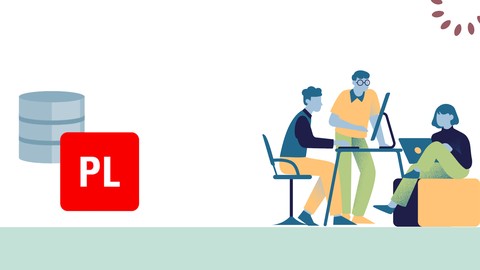
Beginners guide Oracle PL/SQL Part 2
Beginners guide Oracle PL/SQL Part 2, available at Free, has an average rating of 4.5, with 26 lectures, 3 quizzes, based on 4 reviews, and has 342 subscribers.
You will learn about Learn about Cursors Learn about Functions Learn about Stored Procedures IN OUT Parameters in Stored Procedures This course is ideal for individuals who are SQL Developers or Programmers It is particularly useful for SQL Developers or Programmers.
Enroll now: Beginners guide Oracle PL/SQL Part 2
Summary
Title: Beginners guide Oracle PL/SQL Part 2
Price: Free
Average Rating: 4.5
Number of Lectures: 26
Number of Quizzes: 3
Number of Published Lectures: 26
Number of Published Quizzes: 3
Number of Curriculum Items: 29
Number of Published Curriculum Objects: 29
Original Price: Free
Quality Status: approved
Status: Live
What You Will Learn
- Learn about Cursors
- Learn about Functions
- Learn about Stored Procedures
- IN OUT Parameters in Stored Procedures
Who Should Attend
- SQL Developers
- Programmers
Target Audiences
- SQL Developers
- Programmers
This course is second part of Beginners guide Oracle PL/SQL.To fully benefitfrom this course, please ensure you have completed Part 1.
What you will learn.
Cursors
Cursors in PL/SQL are used to fetch multiple rows from a database query. They act as pointers to the result set of a query. There are two types of cursors: implicit and explicit. Implicit cursors are automatically created by PL/SQL for single-row queries, while explicit cursors are defined and controlled by the programmer. Explicit cursors offer more control, allowing operations like opening, fetching, and closing the cursor. Cursors with parameters allow dynamic data retrieval based on input values.
Functions
Functions in PL/SQL are subprograms designed to perform specific tasks and return a single value. They are used for modularity, code reuse, and simplifying complex operations. Functions can take input parameters and must return a value using the RETURN statement. They are beneficial for calculations, data manipulations, and other tasks where a result is needed. Functions can be called from SQL statements, PL/SQL blocks, or other PL/SQL programs.
Stored Procedures
Stored procedures are similar to functions but are designed to perform a series of operations and may not necessarily return a value. They can have input, output, and input/output parameters. Stored procedures are useful for encapsulating business logic, ensuring code reuse, and improving performance by reducing network traffic. They support error handling through exception blocks, making them robust for handling complex operations. Stored procedures are executed using the CALL statement and can perform a wide range of tasks, including data manipulation and transaction management.
These three elements—cursors, functions, and stored procedures—are fundamental components of PL/SQL, enabling efficient database operations and enhancing the functionality of PL/SQL programs
Course Curriculum
Chapter 1: Introduction
Lecture 1: Introduction
Lecture 2: PART 1 COURSE LINK
Chapter 2: PL/SQL Cursors
Lecture 1: PL/SQL Cursors
Lecture 2: LAB – Cursors
Lecture 3: Cursors With Parameters
Lecture 4: LAB – Cursors With Parameters
Lecture 5: Assignment 1
Lecture 6: Assignment 1 Solution
Lecture 7: Assignment 2 ( Using Cursor With Parameters)
Lecture 8: Assignment 2 Solution (Using Cursor With Parameters)
Lecture 9: NEED HELP
Chapter 3: Functions in PL/SQL
Lecture 1: Functions in PL/SQL
Lecture 2: PLSQL – Handle Exceptions in Functions
Lecture 3: LAB
Lecture 4: Assignment- Functions
Lecture 5: Solution Assignment- Functions
Chapter 4: Stored Procedures
Lecture 1: Handle Exception in Stored Procedures
Lecture 2: Stored Procedures
Lecture 3: LAB
Lecture 4: LAB 2 (IN OUT Parameters)
Lecture 5: Assignment 1
Lecture 6: Assignment 1 Solution
Lecture 7: Assignment 2
Lecture 8: Assignment 2 Solution
Chapter 5: Super power your career with Oracle Apex
Lecture 1: Super power your career with Oracle Apex
Chapter 6: Thank you
Lecture 1: Thank you
Instructors
-
Aly Dawood
Programmer/Database Developer
Rating Distribution
- 1 stars: 0 votes
- 2 stars: 0 votes
- 3 stars: 0 votes
- 4 stars: 3 votes
- 5 stars: 1 votes
Frequently Asked Questions
How long do I have access to the course materials?
You can view and review the lecture materials indefinitely, like an on-demand channel.
Can I take my courses with me wherever I go?
Definitely! If you have an internet connection, courses on Udemy are available on any device at any time. If you don’t have an internet connection, some instructors also let their students download course lectures. That’s up to the instructor though, so make sure you get on their good side!
You may also like
- Best Video Editing Courses to Learn in March 2025
- Best Music Production Courses to Learn in March 2025
- Best Animation Courses to Learn in March 2025
- Best Digital Illustration Courses to Learn in March 2025
- Best Renewable Energy Courses to Learn in March 2025
- Best Sustainable Living Courses to Learn in March 2025
- Best Ethical AI Courses to Learn in March 2025
- Best Cybersecurity Fundamentals Courses to Learn in March 2025
- Best Smart Home Technology Courses to Learn in March 2025
- Best Holistic Health Courses to Learn in March 2025
- Best Nutrition And Diet Planning Courses to Learn in March 2025
- Best Yoga Instruction Courses to Learn in March 2025
- Best Stress Management Courses to Learn in March 2025
- Best Mindfulness Meditation Courses to Learn in March 2025
- Best Life Coaching Courses to Learn in March 2025
- Best Career Development Courses to Learn in March 2025
- Best Relationship Building Courses to Learn in March 2025
- Best Parenting Skills Courses to Learn in March 2025
- Best Home Improvement Courses to Learn in March 2025
- Best Gardening Courses to Learn in March 2025






















